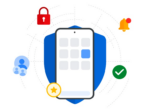
The Android development team has announced the release of the second developer preview for Android 14. This is the final developer preview before the new version enters beta.
This preview includes a number of updates related to privacy and security. For example, Photo Picker, which provides an interface that shows a users’ media library, is recommended for all apps, but for apps that cannot use it for some reason, there is a new dialog that will enable users to choose between three different permission levels: allowing access to all media, allowing access to selected media, and blocking access.
Credential Manager is now available as a platform API in Android 14 to make the sign-in process easier. The API supports passkeys as well as passwords. Key updates in this developer preview include UI improvements for the account selector and API changes.
Other security updates in Android 14 include safer implicit intents and giving foreground apps more control of the ability for other apps to start background activities.
There are also a few updates intended to help with performance. This preview includes a new optimization to the memory management system, which will prevent most background work from happening once an app goes into a cached state.
Another update is that ongoing notification can now be dismissed by the user when their screen is unlocked. Certain notifications, like system and device policy notification, will still be unable to be dismissed, however.
Android 14 also features improvements to the App Store experience for developers. It includes new PackageInstaller APIs, including:
- requestUserPreapproval(), which allows the download of APKs to be delayed until installation has been approved
- setRequestUpdateOwnership(), which allows an installer to indicate it is responsible for future app updates
- setDontKillApp(), which can install optional features while the app is running.
There are also new APIs and intents in regards to regional preferences, which enable users to personalize things like temperature units, numbering systems, and the first day of the week. “A European living in the United States might prefer temperature units to be in Celsius rather than Fahrenheit and for apps to treat Monday as the beginning of the week instead of the US default of Sunday,” David Burke, VP of engineering for Android, wrote in a blog post.






